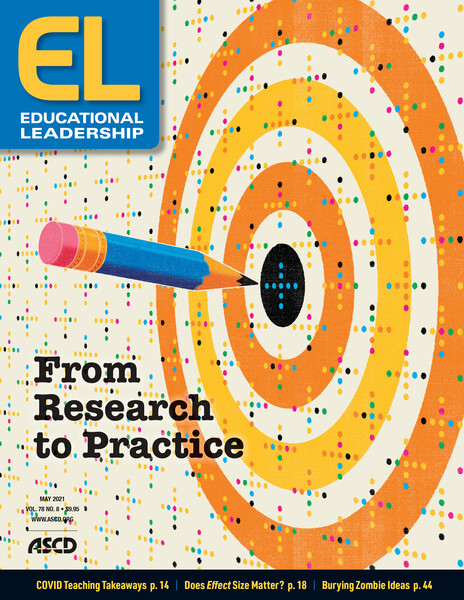Restatement of the obvious is the first duty of intelligent men.
—George Orwell
Professional development for educators is ripe for immense, immediate improvement—for two reasons: (1) it is maddeningly ineffective in its current forms, and (2) the actions necessary for its improvement are remarkably obvious.
Let's get this out of the way first: Despite huge investments of time and treasure, professional development has had minimal overall impact on instructional quality. It hasn't ensured that the best evidence-based practices are routinely employed in classrooms (Odden & Kelley, 2002). Nor has it kept the most deplorable practices from being commonly used: Many students are still subjected to an incoherent, knowledge-poor, worksheet-driven curriculum (Hirsch, 2020). This is especially true for schools serving poor and historically marginalized students.
Yvette Jackson, former director of professional development for New York City schools, has spent her career in teacher education. In a 2011 Washington Post article, she lamented that needed training in best practices is "rarely what [teachers] receive from professional development." This explains how one major school district, according to a report Jackson cited, could spend $500 million on staff development that turned out to be "largely pointless in raising student performance." And why a two-year math-improvement program, implemented in 12 districts, had "no measurable impact" on student achievement (Jackson, 2011).
More recently, the teacher-recruitment organization TNTP published a report on "the hard truth" about professional development—that its assumed impact on student learning is illusory—a "mirage" (2015). Reporting on the study, Education Week's Stephen Sawchuk wrote that regardless of the type of study, "professional development doesn't seem to factor into why some teachers get better at their jobs while others don't" (2015).
But take heart: If we embraced certain principles of high-quality staff development, it would allow schools to enter a "golden age" of effective practice—and student achievement (Petrilli, 2019). Try to tease out these straightforward principles from the following true story.
Four Obvious Principles of Effective PD
An English teacher, in his third year of teaching, joined a middle school faculty that had a coherent, literacy-rich curriculum in place. Importantly, the school also provided an in-depth summer session for staff on the amply proven elements of good teaching. But he came on too late to attend the training.
His need for it was apparent from his principal's first drop-in visit to his classroom: She saw that he only called on students who raised their hands (which allowed most students to tune out or fall behind). Not only that, but he ran through several steps of his lesson before asking students to process or apply what he had taught. He didn't circulate among his students to monitor their progress between chunks of instruction. Nor did he "reteach" when they were visibly struggling.
So, not surprisingly, the principal set him up to receive some much-needed staff development. In those sessions, he wasn't only shown how to execute the elements of good teaching; he practiced them under the guidance of a trainer—until he had demonstrated adequate initial mastery.
One more thing: The principal continued to make brief visits to this teacher's classroom and to give him targeted feedback and encouragement. In just a few weeks, the teacher made enormous strides, and the number of students who succeeded on his daily lessons shot up significantly.
That teacher was me. I hope you concur that the principles that informed my improvement are tantalizingly obvious. If we acted on them more often, professional development would become the engine for unprecedented levels of equity and achievement.
The first principle is foundational; it informs all the others.
1. Embrace the Best Evidence (and Shun Unproven Fads)
It all starts with evidence—with fidelity to those practices which will have the most significant, immediate impact on student learning. Isn't this as obvious as requiring doctors to wash their hands before surgery? And yet, as two eminent researchers recently pointed out in this very magazine, "In education, though, we still don't ‘wash our hands' ": we still don't employ even the most essential, high-leverage practices in most classrooms (Willingham & Rotherham, 2020, p. 71).
We still don't wash our hands. This has to be the most exasperating fact about the current state of education. But it represents a golden opportunity for professional development. Why? Because the largest gains for any organization occur when the most effective practices are introduced into an environment where they are rarely implemented—as is the case in most schools.
To illustrate: We know that for teaching new learning, the use of ongoing "checks for understanding" during a lesson will radically improve student outcomes, especially for struggling students (Lemov, 2015; Payne, 2008). The same can be said of a coherent, knowledge-rich curriculum and its primary ingredient: generous amounts of purposeful reading, discussion, and writing. The evidence for the power and primacy of these elements is unassailable (Schmoker, 2018).
But so is the evidence that they are among the least-implemented elements in schools. For decades, scholars have pointed to the persistent gap between what we know and what we do in schools. Actual practice is "quite different from" proven practice (Odden & Kelley, 2002, p. 19); the most powerful, amply proven strategies seldom take root in the great majority of schools (Tyack & Cuban, 1995). We still don't "wash our hands."
Evidence-based professional development could change this dramatically. The reason it hasn't is quite simple: Too many members of the PD community "are not members of an evidence-based culture." Their priorities are not driven by "empirical research" but by "whims, fads, opportunism, and ideology" (Corcoran, Fuhrman, & Belcher, 2001, pp. 80–82).
That's why inferior practices flourish: curricular chaos (Schmoker, 2018); an overreliance on low-level worksheets (Good & Brophy, 1997); excessive amounts of aimless group work (Bennett, 2015); and the "cutting, coloring, and pasting" that traditionally consume about two-thirds of early-grade literacy instruction (Ford & Opitz, 2002). In the absence of priority-driven, evidence-based training, such malpractice thrives.
The consequences are grim. Only about half of our students read adequately by the end of the 3rd grade—and are thus four times as likely to drop out later (Weyer & Casares, 2019). A large-scale study found that U.S. students, overall, have about a 1:14 chance of receiving an education in line with effective practice; as a result, many classrooms have been devoid of intellectually engaging academic work (Pianta et al., 2007).
Evidence-based professional development would replace such malfeasance with the most powerful, game-changing elements. And because these are immeasurably superior to common practice, the gains would often be large and immediate, occurring within a school year (Schmoker, 2018).
If, that is, we concentrate on them alone—almost exclusively (Schmoker, 2018). Evidence matters. But so does focus.
2. Focus—or Fail
In So Much Reform, So Little Change, Charles Payne identifies the primary reasons for the persistent failure of urban schools. They fail because of "organizational irrationality"—a culture that embraces "innovation" over evidence (2008, p. 64). As examples, he cites the typical lack of a clear, coherent curriculum and the average teacher's failure to incorporate formative checks for understanding into their lessons. If implemented, his research shows, these two elements account for "whopping improvements" in urban achievement. But they usually aren't implemented.
Payne's more overarching finding was that even the best evidence-based initiatives floundered because schools habitually took on too many initiatives at one time. As a result, none of them received the sustained attention—the "depth and intensity" necessary for success (p. 47).
Countless studies confirm this central finding that less is more in organizations. They implore us to devote ourselves exclusively to only one or two initiatives at a time—and to stick with them until they bear fruit (Schmoker, 2018).
I've seen the difference that such focus can make. As an administrator, I once envied a neighboring district's multi-year surge in student learning. While we took pride in our huge, unfocused array of professional development offerings, our neighbor focused almost exclusively on one area in particular: ensuring that every teacher was fully, deeply trained in the fundamental elements of effective teaching (e.g., explicit modeling followed by student practice, checks for understanding, and targeted reteaching). They implemented these in every lesson, every day. In this way, the district became, according to Harry Wong, the best he'd come across in his extensive travels (see chapter 3 in Schmoker, 2018).
The need for focus should be as obvious to us by now as it is to the most enlightened organizations. We should likewise mimic the most enlightened professions by focusing more of our professional development on performance-based training. This is the only way research will translate into practice.
3. Present, But Also Train
As literacy expert Mark Seidenberg writes, American teachers "aren't trained to teach" according to the most critical, evidence-based practices; they are merely exposed to "an eclectic assortment of approaches" (2017, pp. 250–254). Most of us have sat through endless hours of presentations, but without ever being truly trained—in, for instance, how to lead an engaging discussion or how to teach students to actively analyze a text or complete a complex math problem.
Real training involves careful demonstration and explanation by an expert, followed by something all too rare: practice, with coaching and correction, until mastery is achieved. We have yet to realize that effective training should mimic the same basic elements of teaching already mentioned—modeling, guided practice, and checks for understanding. Such training can be conducted in one-on-one tutorials or for groups, just as it is in countless professions where knowledge is applied through performance.
Let's demystify this point: If you want teachers to conduct ongoing formative assessment during their lessons, then provide training sessions in which an expert shows them how, in stages (with teacher-trainees role-playing as students). Then have one of the teachers give the strategy a try—and, as they are coached, aloud, during their attempts to instruct clearly and concisely; circulate around the room; look for patterns of students' visible difficulties; and address those struggles by "reteaching" the class quickly and efficiently—all while the other teacher-trainees observe and learn together. Do this, and your teachers will master these invaluable moves and elements.
That's how the Uncommon Schools network prepares its teachers, with special emphasis on "CFU"—checks for understanding—because the evidence points to it as the pivotal element in effective lessons (Lemov, 2015). Such training has allowed them to become the highest performing charter school network in the United States.
Evidence, focus, and training are essential to improvement. But one more element has been critical to the success of Uncommon Schools: meaningful monitoring.
4. Monitor—"Like Crazy"
Without follow-up observation and feedback, the fruits of training are susceptible to drift and entropy. Sustained, consistent performance depends upon our willingness to observe, guide, and celebrate effective implementation of evidence-based practices. In the early stages of training and implementation, I recommend that observation and feedback be focused less on individuals and more on whole-faculty patterns of need, followed by targeted whole-faculty reinforcement sessions. These should occur, even briefly, at regular faculty and team meetings—not just on the periodic "professional day." This approach is both efficient and humane: It saves time and affords individual teachers the opportunity to refine their practice without feeling singled out prematurely.
But ultimately, after we've provided ample training and follow-up, supervisors must be willing to confront and correct ineffective practice in individual classrooms. This too is obvious—though not always easy. It requires courage and candor on the part of instructional leaders.
The case of Brockton High School in Massachusetts is also instructive. The transformation of this enormous, diverse, high-poverty school began in 1999 with a coordinated effort to build a coherent, teacher-generated curriculum. Importantly, the leadership ensured that generous amounts of "reading, writing, thinking, and reasoning" were built into every course and that teachers were trained in effective instruction.
But as former principal Susan Szachowicz told me, they also "monitored like crazy" to ensure consistent, quality implementation. Her leadership team regularly visited classrooms and provided teachers with critical feedback and ongoing, targeted training. There was initial resistance to this new regimen—until teachers saw its impact. The first year they implemented these evidence-based elements, Brockton's 4,000-plus students made the largest gains in Massachusetts. In the next five years, they rose from the near-bottom to the top 10 percent of schools in the state (Vaznis, 2009).
In light of such results, is it not our duty and our privilege to "restate" and embrace such principles—which would result in unprecedented, life-changing improvements to schooling?
Reflect & Discuss
➛ Of the four "obvious" principles of effective PD that Schmoker describes, which one gets the least attention in your school, and why? How could you shift that?
➛ How many initiatives or areas of focus are being simultaneously implemented in your school? Could you choose just one or two high-impact areas to focus on as a faculty?







